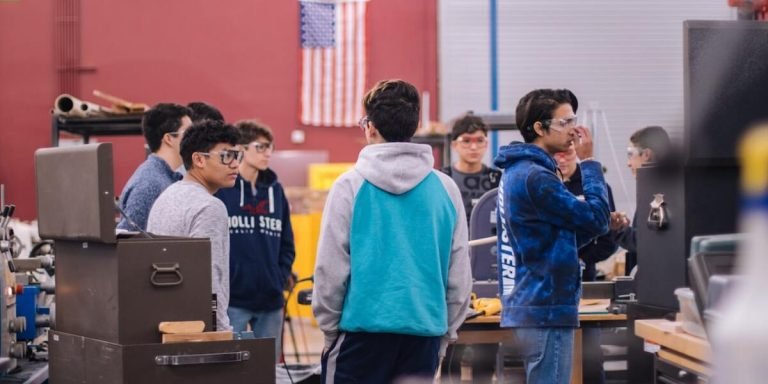Is 5th Grade Middle School? A Comprehensive Exploration into American Education System
Understanding the American education system can be complex, especially pertaining to how grade levels correspond with various school categories. One question that often arises is “is 5th grade middle school?” The answer isn’t as straightforward as one might think; it varies based on district and state policies.
This blog post aims to provide a comprehensive exploration into this topic. Through an in-depth analysis of how schooling structures function across different regions in America, we will strive to clarify where exactly fifth graders belong: elementary or middle school? This information may prove useful for parents navigating the educational journey alongside their children.
Did you know?
In some American regions, the 5th grade serves as the first year of middle school and not elementary school; this unusual arrangement is known as a “5-8” structure.
Understanding the Structure of Middle School Education
The concept of middle school is often a subject of some confusion, especially when one considers the question: “Is 5th grade middle school?” The answer to this query isn’t as straightforward and largely depends on how a specific education system structures its learning stages. In traditional American educational format, Grades K through 5 are typically categorized as elementary while grades 6-8 make up what we consider ‘middle school’. However, it’s worth noting an increasing shift towards incorporating fifth graders into the ‘middle’ category.
Understanding this structure becomes even more crucial given our tech-driven era. As technology continues to evolve in leaps and bounds year after year, so does its integration within various facets of life – particularly in education which now witnesses a seamless blend between conventional teaching methods and modern-day digital solutions.
Fifth graders are no exception to receiving technology-integrated instruction; if anything they’ve become prime beneficiaries of such methodologies due their increased cognitive abilities relative earlier grades. Incorporating gadgets like tablets for interactive learning or utilizing online platforms that aid with homework assignments will be not only instrumental but expected norms by these young learners underlining their transition from primary years toward the complexity offered by middle schools curriculums.
The Role of 5th Grade in Preparing Students for Middle School Challenges
The importance of the 5th grade in preparing students for middle school challenges cannot be overstated. The question often asked, “Is 5th grade middle school?” primarily depends on the structure of individual school systems but no matter which district you’re from, it plays a pivotal role in establishing a strong foundation for later academic pursuits.
Here are some ways educators can leverage technology to enhance learning experiences, based on research and expert opinions:
1. **Digital Literacy** – Understanding how to navigate digital platforms is instrumental in today’s technologically driven world. Fifth-grade classrooms should cultivate these skills by incorporating virtual lessons or online homework sessions.
2. **Gamified Learning** – Technology-based educational games can make challenging subjects more exciting and accessible at this level. They encourage active participation while reinforcing key concepts taught during regular classroom hours.
3.Building Critical Thinking: Various online resources offer an array of problem-solving exercises aimed specifically towards fifth graders.
4.Efficient Communication: Online tools now allow teachers to maintain open lines with parents about their children’s progress – sending updates directly through apps like ClassDojo enhances chances for reinforced learning at home.
Key Transitions: Elementary to Middle School Curriculum and Expectations
Countries have different structures — some start middle schools at fifth-grade; others might begin at sixth or seventh grades.
Several key changes occur during these transitional years. The education structure becomes more demanding, expectations escalate and curriculum content significantly diversifies compared to earlier primary-level learning settings.
Middle School Education implies learners becoming responsible for navigating multiple classrooms each day with unique teachers imparting instruction in specialized subjects like Mathematics, English Language Arts (ELA), Science and Social Studies including technology-based lessons considering it’s 2023 – thus catering better skills development within each discipline area.
Today’s generation operates virtually on digital platforms making Technology Integration vital even in Education sphere which was once considered traditional chalk-and-board domain. With e-learning surge due to pandemics like COVID-19 coupled with technological advancement has made digital teaching tools indispensable guiding force leading towards improved student outcomes by promoting interactive and engaging learning experiences creating future-ready global citizens adapting swiftly to rapidly evolving world around them incorporating artificial intelligence (AI).
Navigating the Shift from Elementary to 5th Grade
Making the transition from elementary school to 5th grade can be a significant change for students, igniting both excitement and anxiety. Schools structures may differ around the world with some signifying 5th grade as middle school while others still categorize it under elementary education. Parents and educators often face challenges associated with this shift as children begin experiencing greater academic demands coupled with social and emotional changes.
This period is typically when technology integration in educational settings becomes more prominent for creating optimal learning experiences. In current times, especially in 2023, leveraging digital tools forms an essential part of teaching strategies at all levels of schooling but markedly so during transitional periods such as moving into fifth-grade or what many could term ‘middle school’. With increased technological involvement comes new opportunities for personalized learning pathways aligning better with student’s capabilities.
However, this does not eliminate the responsibility of schools along parents to ensure that their child’s experience remains balanced across physical activities, enhanced interactions alongside tech-enabled education methods. It’s equally crucial ensuring they’re not overwhelmed by these shifts — needing proactive efforts whereby preparing them to embrace these transformations within their academic journey wholeheartedly.
Comparing Academic Rigor and Social Dynamics Between Grades 4 and 5
Evolving academics are an unmistakable part of this transformation. The curriculum rigor intensifies noticeably during this transition phase. Fourth graders generally find their subjects commensurate with their cognitive ability; focusing on base knowledge that sets the foundation for deeper learning in later stages like understanding number operations, introductory reading comprehension skills and fundamental science theories.
As they progress into the 5th grade though sessions become more demanding – underlining complex mathematical problems such as decimals and fractions amongst others alongside delving into detailed historical events through text materials thereby strengthening literacy competencies. This surge helps prepare them better for rigorous upper-level studies subsequently serving dual purpose- keeping students engaged while propelling intellectual stimulation.
Technology integration plays a crucial role in advancing academic objectives by fostering experiential learning opportunities. Interactive platforms and web tools, such as Google Classroom, Kahoot!, and Quizlet, benefit students by:
- Deepening content understanding
- Fostering collaborative online peer interaction
These digital resources have reshaped the classroom experience, particularly during the pandemic-induced home-schooling scenario that remains prevalent in many parts even amid 2023 education dynamics.
Assessing Readiness: Is Your Child Prepared for the Leap into Middle School?
As your child makes the pivotal leap from elementary school to middle, often marked by entering 5th grade, you may find yourself grappling with a pervading question – “Is 5th grade middle school?” The transition can be daunting both for parents and children. It is vital as this shift involves not just an academic transformation but also emotional readiness.
Assess your child’s holistic preparedness to determine if they are ready for this new educational stage. Consider the following:
1. **Academic Maturity:** With moving towards more advanced curriculum in fifth-grade or even considered the onset of middle-school learning environments in certain education systems, academic resignation comes at the fore-front.
2. **Emotional Intelligence:** Stepping up academically implies dealing with complex scenarios that require improved problem-solving capabilities; hence nurturing emotional resilience could act as a buffer during trying times.
4-**Technological Savviness**: In today’s digital age where childhood education encompasses technology on various levels like never before especially post-pandemic era we live in since 2020s it’s indispensable how well-acclimated your child stands around gadgets pertinent within classrooms such as tablets smartboards etc This becomes even crucial given thrust schools putting onto STEM Education (Science Technology Engineering & Mathematics).
The Importance of Parental Involvement at the Cusp of Middle School
Navigating the transition from elementary to middle school can be a daunting prospect for many 5th graders, marking as it does not just an academic progression but also significant emotional and social changes. This period of transformation is further complicated by varying regional definitions; while traditionally viewed as part of elementary education in a number of states, there are districts where 5th grade falls under the umbrella term ‘Middle School’. These uncertainties underscore the critical role parents play at this juncture.
Parental engagement helps educators understand each student better, leading to tailored instruction methods. These methods are particularly crucial during transitions like entering middle school. The significance of parental involvement grows with technology’s deep integration into education, a reliance that spiked during the recent COVID-19 pandemic (2019-2020).
Moving into 2023 and beyond, we face new challenges in effectively using growing technological tools in classrooms. Active participation from both tech-savvy parents and teachers will continue to be essential in fostering successful academic journeys for students.
Strategies for Supporting Your Child Through the Transition to Higher Grades
The transition from elementary to middle school can indeed be a considerable leap, both academically and emotionally for children. As parents, it’s crucial that we stay involved in our child’s education as they embark on their journey into higher grades such as 5th grade – an intersectioning period where many schools often consider this critical phase the stepping stone of middle school education.
1. Encourage Open Conversations: Start discussions with your child about what to expect and how their routine might change once they enter these higher grades like the 5th grade or when transitioning into middle-school.
2. Introduce Technology Early On: With technology playing a pivotal role in today’s educational systems, integrating tools like tablets or laptops early on helps familiarize them with digital learning methods prevalent across most modern schooling practices in 2023.
3. Set Clear Expectations: Establish clear academic expectations but allow room for flexibility knowing that adapting to more advanced coursework may require time.
4 Leverage Online Learning Platforms : There are plenty of interactive online platforms available nowadays designed specifically for upper-elementary students transitioning towards middle-school curriculum needs — make good use out of them!
Creating a Collaborative Environment between Parents, Teachers, and Students
As the transition from elementary to middle school education happens, a common question often asked is “Is 5th grade middle school?” The reality of this shift can be significant for children. Integrating technology in education has become increasingly prevalent and vital as we progress further into 2023.
To cope with such shifts, creating a collaborative environment between parents, teachers and students proves highly beneficial. In answering whether ‘is 5th grade middle school’, understanding that it varies across districts helps but what remains constant is the need for an enriching learning experience at this phase which integrates modern developments like technology.
Teachers’ roles are equally crucial during these critical years marked by changes both academically and emotionally among learners transitioning into adolescence from childhood- stages needing particular attention while determining if ‘is fifth grade middle school’ or not.
Thanks to digital tools today; collaboration becomes smoother letting teachers provide individualized feedback directly over assignments using platforms designed specifically for classroom application! These same technologies enable real-time communication channels between educators & parents taking transparency regarding student performance beyond conventional PTMs!
Conclusion
As we conclude our journey, let’s remember that education structures can vary, and so the answer to “is 5th grade middle school” is not always a simple yes or no. It depends on your geographic location within America and what educational structure your local district follows. While it may seem puzzling at first glance, understanding this variability helps us better navigate the intricacies of American schooling.
Don’t stop here! Our website hosts a wealth of information aimed at helping you make sense of these complexities in childhood education. Whether you’re an educator searching for teaching strategies or a parent needing support navigating their child’s educational journey – we’ve got you covered with resources tailored to meet those specific needs.
So go ahead – dive into other articles across our site where clarity awaits amidst the maze called ‘education’.







